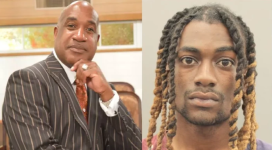
Whether it involves competitors or pushback from users over surge pricing, the ride-sharing service Uber has been aggressive in defending its position. At CES (The International Consumer Electronics Show) in Las Vegas yesterday, Uber's top policy lobbyist took a similar stance when asked about his company's approach to regulatory compliance in local markets.
"I don't know why one would have to ask permission to provide an awesome service," said Justin Kintz, Uber's policy director. Kintz appeared on a panel at CES with other company executives from competitor Lyft and the crowd-sourced review site Yelp, along with a staff member for U.S. Congressman Tom Marino (R-PA), as part of a discussion on "How Disruptive Innovators Deal With Policy Regulations."
Guided by moderator Alan Murray, the editor of Fortune Magazine, the discussion quickly turned from "how innovators deal with regulations" to "how to get what you want despite regulation" as both representatives from Uber and Lyft openly stated their belief that antiquated rules are holding back disruptive industries such as theirs.
"Our interpretation is that you can't regulate something like this the same way you regulate a hundred year old industry," said Uber's Kintz. His company has become a major competitor for taxi services in multiple cities across the United States.
Both Uber and Lyft have struggled to overcome regulatory resistance in many urban areas. According to David Mack, the policy director for Lyft, Illinois, Colorado, California, and the District of Columbia have been willing to accommodate ride-sharing models in their communities.
But the companies have encountered stiff resistance in cities such as Las Vegas and Houston. "There's a lot of misinformation out there," said Mack.
Fortune's editor pointedly asked Uber's policy director about why his company chose to begin service in Portland, Oregon despite clear opposition from the local city council and threats of heavy fines for ride-sharing drivers. Lyft had backed away from Portland when asked to defer by local officials.
Kintz again defended his company's right to enter any market, but also pointed out that Uber did ultimately agree to suspend operation in Portland for three months while working out an agreement with the city government. "We make no apologies for wanting to compete in markets," said Kintz.
Jaclyn Louis, legislative director for Congressman Tom Marino, admitted that current laws seem poorly designed to make life easier for disruptive innovators like Uber. "Our laws certainly reflect the entrenched industries," said Louis.
She also expressed a belief that with the Republicans taking command this week in both the House and Senate, the prospects for legislative passage of bills that could potentially help technology innovators was much higher "than it has been for the past five or six years." Louis pointed out that the influx of newer members in Congress is bringing the average age down to around 53, which could help as well.
Despite hopeful signs in Congress, innovative firms are still facing threats from the legal system. Luther Lowe, the public policy director for Yelp, expressed concern about a court case in Virginia that could have a chilling effect on free speech in the online world.
The case involves a carpet cleaning service which sued Yelp after several negative anonymous reviews were published on the site. Claiming that they were defamed, the carpet cleaner has already won a court order for Yelp to disclose the identities of the negative review authors. Yelp has appealed this decision to the state Supreme Court.
"If we don't prevail in the state Supreme Court, this will have troubling implications for online free speech," said Lowe yesterday.
All three disruptive company policy directors expressed belief that the support of online users has been instrumental in protecting their positions against undue regulation. "The power of the people is the only thing that will carry you through when you are facing entrenched interests," said Uber's Kintz.
One of the sore points for many of Uber's users has been the company's use of surge pricing, which raises rates steeply during periods of high demand. Kintz defended the pricing model, saying that Uber must "rely on dynamic pricing to ensure reliability." He also pointed out that the ride sharing model has been far more effective than the process used by traditional cab companies where taxis can be scarce when the need is greatest.
The policy battles for disruptive innovators such as Uber, Lyft and Yelp appear to be reshaping the legal landscape as they challenge the status quo. "We are two and a half years into a decades long experiment," said Lyft's Mack. And as he and his policy counterparts made it clear yesterday, they have no intention of backing away from any fight.







